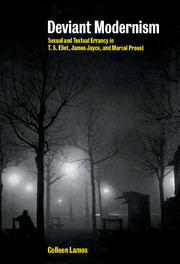Book contents
- Frontmatter
- Contents
- Acknowledgments
- List of abbreviations
- Introduction
- 1 Straightening out literary criticism: T. S. Eliot and error
- 2 The end of poetry for ladies: T. S. Eliot's early poetry
- 3 Text of error, text in error: James Joyce's Ulysses
- 4 Sexual/textual inversion: Marcel Proust
- Conclusion
- Notes
- Index
Conclusion
Published online by Cambridge University Press: 22 September 2009
- Frontmatter
- Contents
- Acknowledgments
- List of abbreviations
- Introduction
- 1 Straightening out literary criticism: T. S. Eliot and error
- 2 The end of poetry for ladies: T. S. Eliot's early poetry
- 3 Text of error, text in error: James Joyce's Ulysses
- 4 Sexual/textual inversion: Marcel Proust
- Conclusion
- Notes
- Index
Summary
What a paradox was to me in the sphere of thought,
perversity became to me in the sphere of passion.
Oscar Wilde, De ProfundisIt has become a truism that modernist writers espoused an ideology that promoted the belief that the work of art is an autonomous, organically unified whole, transcending its historical moment to achieve a putatively universal, uniquely aesthetic value. Eliot's remark concerning Joyce's use of Homeric myth as a way “of controlling, of ordering, of giving a shape … to the … anarchy which is contemporary history” (SP 177) has itself been ripped out of context in order to serve as a touchstone for this interpretation of modernism in which Eliot exemplifies the error of its ways. However, a closer analysis of Eliot's writings, as of Joyce's and Proust's, fails to sustain this coarse-grained and often polemical critique. On the contrary, their works demonstrate a fundamental skepticism toward such an aesthetic ideology.
Throughout his career, Eliot was deeply suspicious of claims for the transcendent value of art and its “higher” truth because he believed that such matters were, at bottom, theological, not aesthetic. To make art into a religion, to substitute it for faith, or to take comfort in the former as a consolation for the loss of the latter was, in his view, to commit Arnold's mistake.
- Type
- Chapter
- Information
- Deviant ModernismSexual and Textual Errancy in T.S Eliot, James Joyce, and Marcel Proust, pp. 217 - 229Publisher: Cambridge University PressPrint publication year: 1998



